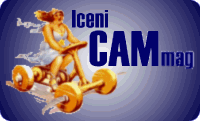Introduction
Iceni CAM Magazine
This is the home of the Iceni CAM Magazine—a
free e-magazine about Cyclemotors, Autocycles, Mopeds … and
more. It was launched on 15 April 2007 and the most recent ten issues
can be downloaded here. All the articles from all the previous magazines are on
this website. For non-computerised folks, printed copies are
available at £1.50 per edition; we can accommodate mail order too at £3.02
for single edition or £12.20 for a year’s subscription.
So what’s it about?
It’s an e-magazine all about cyclemotors, autocycles and mopeds that
carries road test & feature articles, rally reports, free adverts and other
assorted information. Although we are an independent production, we
have strong ties to the EACC and also to the New
Zealand Cyclaid Register.
We are based in East Anglia, but are by no means limited to that
area. Much that appears in the magazine is of universal appeal.
We welcome contributions, wherever they are from, and are also happy to
help to publicise any events for cyclemotors, autocycles and mopeds.
When’s it published?
We publish four times a year at the beginning of January, April, July,
and October. Iceni CAM is purely an enthusiast production, and
all produced on a tiny budget. The free downloadable version will be
posted on this website on the same day as the printed version goes on
sale.
All the issues of CAM Magazine that we’ve produced have been very well
received. Thank you all for your comments; they are much
appreciated. Several of you have also made donations, which has
helped enormously in keeping Iceni CAM going.
What’s in it?
The January 2026 edition is available now on our Downloads Page.
Main feature: Crazy
The Matta is a stunning machine, and one that
we never thought we’d ever get to ride, because even though other earlier
Guazzoni models were sold in the UK, the Matta was never imported here.
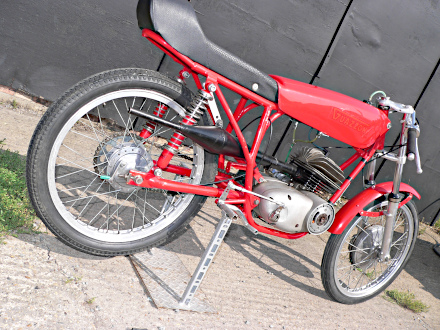
It’s one of the most extraordinary motor cycles that you only
infrequently see pictures of, but never realistically expect to see, let
alone ride. Tim Adams fixed that situation by bringing this 50cc
piece of art into the country, and road registering it; and when he offered
it to IceniCAM for feature—Wow! Yeah!
So, on 6 August 2025 we arranged to go to Tim’s unit and collect the
bike to sort out for road test. Arriving on site, there was the
Guazonni, just standing outside, no sign of Tim, so we passed some time
just doing the main photo-shoot while waiting for him to turn up!
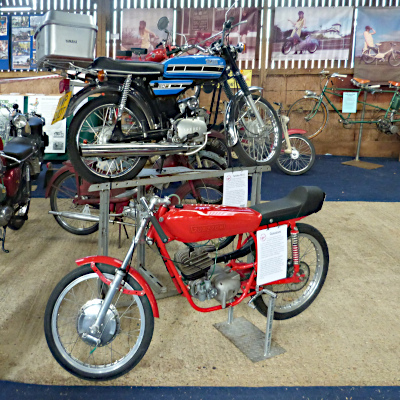
The Guazzoni at Copdock Show
Re-commissioning the bike in preparation for road test was a case of
treading lightly and trying to research as we went, except that actual
technical information generally proved somewhat lacking. It quickly
became obvious that the Matta motor was built in various specifications,
but trying to figure out what we had proved difficult to nearly
impossible. There seemed so much difference between the many
models.
The carburettor had obviously been changed, but for any other components
it was really hard to tell. It’d obviously had a lot of money and
effort thrown at its restoration as a fabulous looking racer, and was
fitted with all the best quality parts, but what was actually
original? It all looked so right, and we just had no idea.
The riding position felt every bit as uncomfortable as imagined, though
probably no issue for the usual young, slim, and supple riders of these
race-style machines, while we have none of these qualities…
Once we were able to actually run and ride the bike, it clearly wasn’t
going to display the fiery performance we were expecting, and turned out to
be a whole ratio over-geared for the revs it could actually pull. To
extract more performance from one of these machines may well require some
specialist expertise, and we didn’t even know what the compression ratio
and ignition timing setting was supposed to be!
It was enough that we got to ride the Guazzoni at all, and we also had
the bike for the EACC stand at Copdock Motorcycle Show on 7 September,
where it attracted a LOT of admiration.
In the English language, crazy is just crazy… But the Italian
language has words in male and female genders (like French). Matto =
crazy in the male gender, while Matta = Crazy in the female gender, so
technically, maybe Matta reads as ‘Crazy Woman’?
Many thanks to Tim Adams, who also sponsored the article.
First Support feature: A what?
The title makes sense when you tell people
what the bike is—it’s always the same response.
Le.Ri models seem most infrequent, among the most rare and obscure of
machines, and there is little documented information about the company,
which greatly limits what we might be able to present.
Since the Le.Ri company is still operational, we reached out to them by
sending an enquiry on the company website e-mailer—but were disappointed to
receive no reply. Oh well, guess we have to do it all on our own
then…
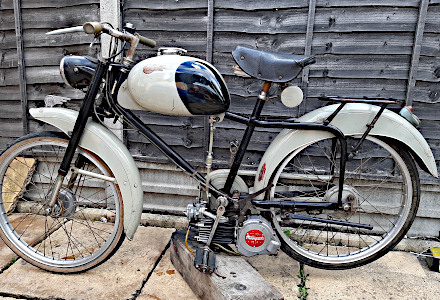
1956 Le.Ri framed Mosquito cyclemotor
Photo: Tim Adams
It’s another Tim Adams bike, and if you’ve been following our series
you’ll already know that he keeps coming up with remarkable Italian exotica
that we’d never ordinarily expect to see. We’d never seen a Le.Ri
before, though Tim said he previously had a couple of earlier Le.Ri framed
cyclemotors, but never a sports moped like this one! Well yes, it was
certainly a very unusual and interesting machine, incorporating several
features we’d never seen before! The three brakes being operated only
by the single hand lever was as extraordinary as it was ineffective, and
the braced frame tube extensions being extended to the rear
footrests. Imaginative aspects indeed…
We’d seen the Demm engines in Demm″s own mopeds at continental events a
number of times, but never encountered any in the UK even though Dick-Dick
Tourist and Sports models were briefly imported from July 1959–60.
Presumably they weren″t selling many.
Demm 2-speed and 3-speed engines were also fitted by Legnano and Testi
during the late 1950s, but neither of these brands were sold in Britain, so
having never ridden these period Demm motors before, we knew very little
about them. Reference information also proved difficult to find.
Later single-speed automatic Demm Dove models were imported to Britain
from March 1972–March 1976. We had some experience with these
machines, but they were a completely unrelated design to the earlier geared
models.
Le.Ri still continues selling bicycles, electric bikes, and accessories;
and Demm still continues design, manufacture, and assembly of gears,
shafts, bevel gears, and measurement instruments, but it’s very unlikely
the two companies will get together to make mopeds again.
Sponsored by Michael Neden, Manchester.
Sorry if anyone might think that the
Motobécane X1 is a good mini-bike, but there are actually a lot of better
mini-bikes.
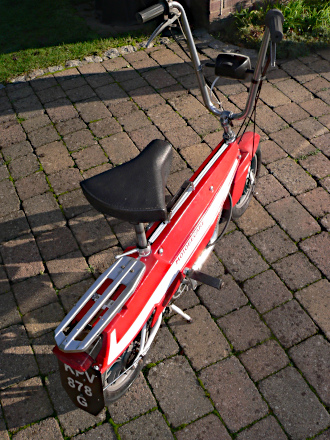
The X1 is miserably slow, yet still manages to demonstrate terrible
handling at barely 20mph, and if you might need practically any spares,
finding compatible parts can be a bit of a problem. Now for the good
news: it folds up really small and fits in the boot of a car.
This wasn’t really intended to be a feature since we’d already covered
the X1 quite comprehensively before, and the bike only really came to the
workshops as an engine fix for a friend. The Isodyne motor, however,
was beyond practical recovery, and we didn’t have the parts—but we did have
a complete Super-Isodyne engine, which drops straight in. A routine
road test was performed just to check it worked OK, then we thought to take
some brief notes and a few pictures just for the record—until three years
later, comes the idea to make an article of it.
It would probably have made a better article if it had actually gone as
quickly as the M3PRTS Cady with the same Super-Isodyne engine, which
clocked 27mph sitting upright on flat, and 33 downhill—but it didn’t…
Theoretically, it should have been possible since the drive ratio works
out the same as X1, but maybe the performance got lost in the
vibrations? The M3PRTS suffered less from vibrations, so presumably
had a less susceptible frame design, while X1 seemed the most vibration
prone. Maybe the Super-Isodyne motor wasn’t on peak form, but it
still went better than the original Isodyne, so who knows?
Our Super-Isodyne X1 came from Jon Chambers at Snape, and the
photo-shoot dated from December 2022. “Mission Impossible” was
sponsored by a donation from Sandy Ross, EACC, Hertfordshire.
What’s Next?
The next magazine is scheduled for publication at the beginning of April
2026.
Next Main Feature: We’re booked to collect a 1950s’ 48cc French
cyclemotor for our next main feature, but some of the dimensions we’re
given are causing concern? The wheelbase is over 6½ feet, and
total length is given as nearly 8ft! Surely this can’t be
right? What is this thing?
Next First Support: The famous cyclemotor boom of the 1950s was
over and done by 1960, but that wasn’t the end of the cyclemotor!
During the early 1970s, and fuelled by the period fuel crisis, there was
another brief resurgence of second generation cyclemotors in the USA.
Frozen in a time bubble we find a brand new cyclemotor, still in its
original box! Claims of the period are that ‘using the instructions,
you can assemble one of these motors to a bicycle within just a couple of
hours’ … OK, we have a suitable bicycle, so where are the
instructions? Ah, maybe here in this packet … but they’re all in
Japanese! Well, we’ve got three months, maybe we can figure it out in
time … or maybe we can’t … deadlines can be tough!
Next Second Support: The electronic age finally catches up with
the humble moped, but is it just ‘Pointless’?
What else?
Well, there’s this Website … we’ve put a lot of useful information
here, and we’re alwas adding to it. We have a directory of useful people to know. Information on
local events and, after each run, we put photos of the event on this website. There’s
also a market place where you can buy and sell
mopeds, autocycles, cyclemotors and other related items

As each edition of the magazine is published, we add to our collection
of articles. From Edition 3 of the
magazine, we introduced another evolution. Previously, features in
the articles section had reflected what
appeared in the magazine, but you may now discover a bit of extra content
has crept into some items as they’ve transferred to the website—you might
call it ‘The Directors Cut’. The problem with printed magazines is
editing everything to fit page sizes and space, and there can sometimes be
bits you’d like to include, but they have to be left out to fit the
available space. The web articles don’t need to be constrained by the
same limitations so, although the text will remain the same, the ‘Directors
Cut’ graphic in the header indicates the item carries extra pictures and
bits that didn’t make it to the magazine.
We also have an Information Service—if you want
to know more about your moped, we can help.
What we do
Iceni CAM Magazine is committed to celebrating
all that’s good about the Cyclemotor, Moped and Autocycle scene;
researching toward the advancement of the pool of knowledge about
cyclemotors, autocycles, old mopeds, and other oddities; and the
publication of original material. We are a declared non-profit making
production, though we still need to fund everything somehow to keep the
show on the road.
The magazine is free on line, and the nominal price of supplying hard
copies to non-computerised folks is pitched only to cover printing and
postage. All advertising is free since we believe that the few people left out there providing parts & service for
these obsolete machines do so as a hobby and an interest. This
involves far more effort than reward, and they should be appreciated for
the assistance they provide. Our Information
Service is there to help anyone needing manuals to help with
restoration of a machine. We make a small charge for this but, again,
we have set our prices so the just cover postage and material costs.
However, we are trying to make this free too! We are setting up an
on-line library where you can download
manuals at no charge.
Overheads involve operation of the website, and particularly the
generation of features. Articles like Last Flight of the Eagle can cost as little as £20 to
complete, while others have cost up to £150 to generate, eg: Top Cat on
the Leopard Bobby. With these overheads, you may be wondering how we
get the money to keep it all going. So do we! But, somehow, it
works, helped by a number of generous people who have sponsored articles or
made donations to keep the show on the
road.
How long does it take to research, produce, and get these feature
articles to press? Well, up to two years of preparatory research in
some cases, where little is known about the machine or its makers, and
where nothing has been published before. Then, collating all the
information and interviews, drafting and re-drafting the text, travel and
photoshoots typically account for up to 40 to 50 hours to deliver the
package to editing.
There are many examples where these articles have become the definitive
reference material for previously unpublished machines like:
Ambassador Moped,
Dunkley Whippet & Popular,
Elswick
Hopper Lynx,
Leopard Bobby,
Mercury Mercette & Hermes,
Ostler Mini-Auto,
Raleigh
Ireland Super,
Stella
Minibike,
…and many others.
We’re committed to continuing to produce these articles, because we
believe it needs to be done, and we’ve got a proven track record for
achieving it. Nobody else has done it in 50 odd years, so if we don’t
do it—who will?
To whet your appetite for what’s ahead, here’s an updated
list of machines with developing articles for future features:
Ariel Pixie;
Beretta–Mosquito;
Capriolo 75 Turismo Veloce;
Cyc-Auto (Wallington Butt) & Cyc-Auto (Villiers);
Dunkley S65 & Whippet Super Sports;
Elswick–Hopper VAP MIRA test prototype;
Gilera RS50;
Hercules Her-cu-motor;
Honda Gyro Canopy, Model A, CD50, & SS50;
James Comet 1F;
MV Agusta Liberty;
Norman Nippy Mark 3;
Powell Joybike;
Paul Maye tandem;
Rabeneick Binetta;
SER–Itom Tourist;
Simson SR2E;
Solifer Speed;
Sun Autocycle & Motorette;
Tanaka TAS Spitz;
Vincent Firefly;
The working list changes all the time as articles are completed and
published, and further new machines become added—so as you see, there’s
certainly no shortage of material.
Readers have probably noticed a number of the articles collecting
sponsorship credits, and we’re very grateful for the donations people have
made toward IceniCAM, which certainly assures we’re going forward into
another year. We don’t need a lot of money since IceniCAM is a
declared non-profit making organisation, and operates on a shoestring (and
we’d like to keep it that way)—run by enthusiasts, for enthusiasts.
It’s easy to sponsor an article by either picking a machine from the
forward list, and we’ll attach your credit to it, or simply making a
donation. There is no fixed amount, it’s entirely up to you, and
however large or small, we’re grateful for any contribution to keep the
show on the road.
If a vehicle you’re interested in seeing an article about isn’t in the
list, then let us know and we’ll see about trying to add it in the
programme, but we do need access to examples—perhaps you have a machine
you’d like to offer for a feature?
See the Contact Page for how to: Sponsor an article–Enter a free advert–Submit an article yourself–Write a letter to us–Propose a machine for feature–Offer your machine for test feature …
